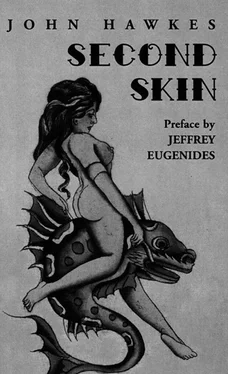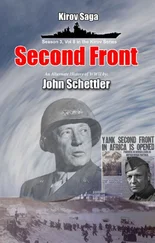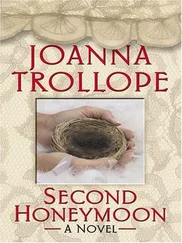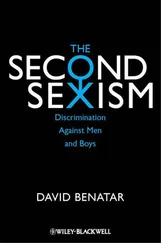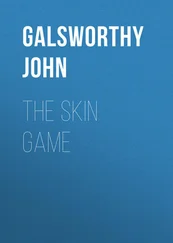“Cassandra? Hungry, Cassandra?”
He had diced celery into cubes, had cut olives into tiny green half-moons, had used pimento. Even red pimento. The moonlight came through the window in a steady thin slipstream and in it Cassandra’s face was a small luminous profile on a silver coin, the coin unearthed happily from an old ruin and the face expressionless, fixed, the wasted impression of some little long-forgotten queen. I looked at her, as large as I was I wriggled, settled myself still deeper into the journey — oh, the luxury of going limp! — and allowed my broad white knees to fall apart, to droop in their infinite sag, allowed my right arm, the arm that was flung across sleeping Pixie, to grow numb. I was an old child of the moon and lay sprawled on the night, musing and half-exposed in the suspended and public posture of all those night travelers who are without beds, those who sleep on public benches or curl into the corners of out-of-date railway coaches, all those who dream their uncovered dreams and try to sleep on their hands. Suspended. Awake and prone in my seat next to the window, all my body fat, still, spread solid in the curvature of my Greyhound seat. And yet in my back, elbows, neck, calves, buttocks, I felt the very motion of our adventure, the tremors of our crosscountry speed. And I felt my hunger, the stomach hunger of the traveling child.
“A little picnic for the two of us, Cassandra?”
She moved — my daughter, my museum piece — and hoisted the sack onto her lap and opened it, the brown paper stained with the mysterious dark oil stains of mayonnaise and tearing, disintegrating beneath her tiny white efficient fingers. Brisk fingers, mushy brown paper sack, food for the journey. She unwrapped a sandwich, for a moment posed with it — delicate woman, ghostly morsel of white bread and meat — then put it into my free hand which was outstretched and waiting. The bread was cold, moist, crushed thin with the imprint of dear Sonny’s palm; the lettuce was a wrinkled leaf of soft green skin, the bits of pimento were little gouts of jellied blood, the chicken was smooth, white, curved to the missing bone. I tasted it, sandwich smeared with moonlight, nibbled one wet edge — sweet art of the mess boy-then shoved the whole thing into my dry and smiling mouth and lay there chewing up Sonny’s lifetime, swallowing, licking my fingers.
My daughter was safe beside me, Pixie was sleeping on, dreaming the little pink dreams of her spoiled life, my mouth was full, the sailor was moaning. And now the distance threw out the first white skirts of a desert, a patch of poisoned water and a few black rails of abandoned track. I saw the salt mounds, the winding gulch, far off a town — mere sprinkling of dirty mica chips in the desert — and in the pleasure of this destitute world I was eager to see, eager to eat, and reached for another sandwich, stuffed it in. For Sonny.
But then I noticed her folded hands, her silent throat, the sack near empty on her lap, and I stopped in mid-mouthful, paused, swallowed it all down in a spasm: “Cassandra? No appetite, Cassandra?”
She did not answer. She did not even nod. And yet her face was turned my way, her knees tight, elbows tight, on one side not to be touched by thigh of sprawling father, on the other not to be touched by the stenciled name of the seaman whose duffel bag stood as tall as her shoulder and threatened her with reprehensible lumps and concealed designs, and in the thrust and balance of that expression, the minted little lips and nose, the bright nested eye, she made herself clear enough. No appetite. No sensation in a dry stomach. No desire. No orchids sweet enough to taste. Not the sort of woman to eat sandwiches on a bus. At least not the sort of woman who would eat in the dark. Not any more.
But I was alarmed and I persisted: “Join me, Cassandra. Please. Just a bite?”
She waited. Then I heard the firmness of the dreaming voice, the breath control of the determined heart: “My life has been a long blind date with sad unfortunate boys in uniform. With high school boys in uniform. With Fernandez. With you. A long blind date in Schrafft’s. A blind date and chicken salad sandwiches in Schrafft’s. With little black sweet pickles, Skipper. Horrible sweet pickles. Your sandwiches,” the whisper dying out for emphasis, secret, explanatory, defensive, then rising again in the hush of her greatest declamatory effort, “your sandwiches make me think of Gertrude. And Gertrude’s dark glasses. And strawberry ice cream sodas. And Gertrude’s gin. I can’t eat them, Skipper. I can’t. You see,” now leaning her head back and away, small and serpentine in the moonlight, and watching me with her wary and injured eyes, “nothing comes of a blind date, Skipper. Nothing at all. And,” moving her naked fingers, crushing the wax paper into a soft luminous ball, “this is my last blind date. A last blind date for Pixie and me. I know you won’t jilt us, Skipper. I know you’ll be kind.”
I wriggled. I blushed. I took the sandwich. I heard the catgut notes of the ukelele — vision of French letters floating downstream in the moonlight — I heard the black turbine roaring of our diesel engine, beyond this metal and glass heard the high wind filled with thistle and the flat shoe leather bodies of dead prairie rodents. And I was wedged into the night, wedged firmly in my cheerful embarrassment, and chewing, frowning, hoping to keep her feathery voice alive.
Our picnic, our predawn hours together on this speeding bus, our cramped but intricate positions together at the start of this our journey between two distant cemeteries, the nearly physical glow that begins to warm the darkest hour at the end of the night watch — when sleep is only a bright immensity put off as long as possible and a man is filled with a greedy slack desire to recall even his most painful memories — in all the seductive shabbiness of the moment I felt that I knew myself, heart and stomach, as peaceful father of my own beautiful and unpredictable child, and that the disheveled traveler was safe, that both of us were safe. We too would have our candy bars when the sun rose. Sonny had provided the sandwiches but I myself had thought of the candy bars, had slipped them secretly into the flight bag with Cassandra’s stockings and Pixie’s little fluffy pinafore. We too would have our arrival and departure, our radio broadcast of victory and defeat. In the darkness the driver sounded his horn — triple-toned trumpet, inane orchestrated warning to weak-kneed straying cows and sleeping towns — and my lips rolled into the loose shape of a thoughtless murmur: “Happy, Cassandra?”
“I’m sleepy, Skipper. I would like to go to sleep. Will you try?”
I chuckled. And she smoothed down her frock, brushed the empty paper bag to the floor, pressed her hands together, palms and fingers straight and touching as the child prays, and without glancing at me lay her cheek on her clasped hands and shut her eyes. As if she had toileted, donned her negligee, turned with her face averted and drawn the shade. Modest Cassandra. While I chuckled again, grimaced, rolled my head back to the window, grunted under the weight of Pixie — bad dreams, little pig sounds — then sighed and swung away and dropped to my army of desperate visions that leapt about in the darkness. But safe. Sleeping. Outward bound.
But wasn’t Cassandra still my teen-age bomb? Wasn’t she? Even though she was a war bride, a mother, a young responsible woman of twenty-five? At least I thought so when at last I awoke to the desert sunburst and a giant sea-green grandfather cactus stabbed to death by its own needles and to the sight of Cassandra begging Pixie to drink down a little more of the canned milk two daysold now and pellucid. And wasn’t this precisely what I loved? That the young-old figure of my Cassandra — sweet queenly head on an old coin, yet flesh and blood — did in fact conceal the rounded high-stepping baby fat and spangles and shoulder-length hair and dimples of the beautiful and wised-up drum majorette, that little bomb who is all hot dogs and Egyptian beads? Wasn’t this also my Cassandra? I thought so and for the rest of the day the emotions and problems of this intensive fantasy saved me from the oppressive desert with its raw and bleeding buttes and its panorama of pastel colors as outrageous and myriad as the colors that flashed in the suburban kitchen of some gold-star mother. Saved me too from our acrobatic Pixie who at lunchtime added smears, little doll-finger tracks and blunt smudges of Nestlé’s chocolate to my white naval breast already so crumpled and so badly stained. Smelling the chocolate, glancing at the unshapely humps and amputated spines, thorns, of miles of crippled cacti, I only smiled and told myself that the flesh of the cheerleader was still embedded in the flesh of Pixie’s mother and so soothed myself with various new visions of this double anatomy, this schizophrenic flesh. And toward sundown-more chocolate, more smearing, end of a hot and untalkative and disagreeable day — when I was squinting between my fingers at the last purple upheaval of the pastel riot, I struggled a moment — it was a sudden cold sickening speculation — with the question of which was the greater threat to her life, the recklessness of the teen-age bomb or the demure determination of the green-eyed and diamond-brained young matron who was silvery, small, lovable with bare legs and coronet? It was too soon for me to know. But I would love them both, scrutinize them both, then at the right moment fling myself in the way of the ascendant and destructive image. I was still scowling and loving her, suspecting her, when the desert fireworks suddenly ended and the second night came sweeping up like a dark velvet wind in our faces.
Читать дальше
